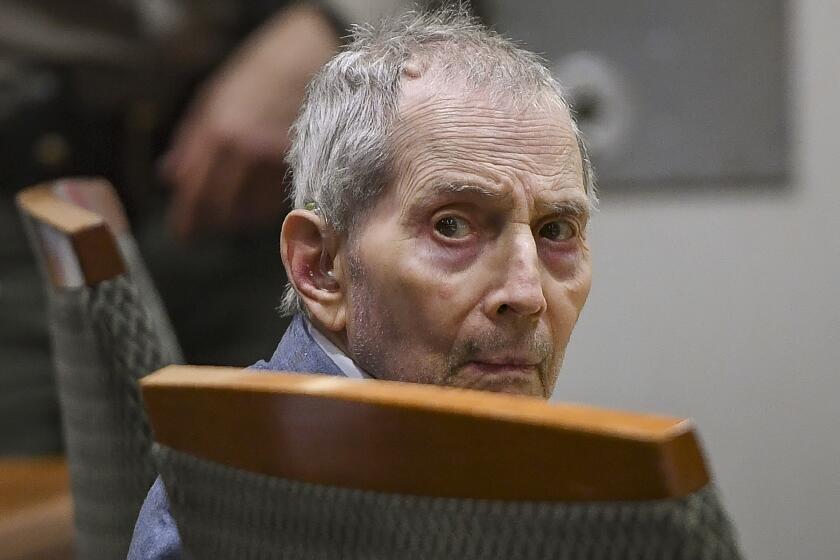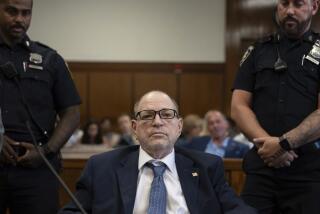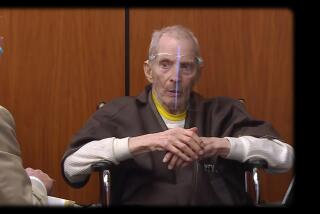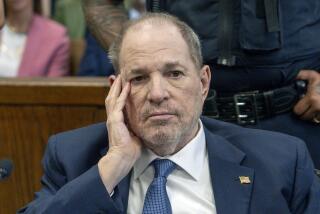Robert Durst hospitalized, judge says, forcing another stay in long-delayed murder trial
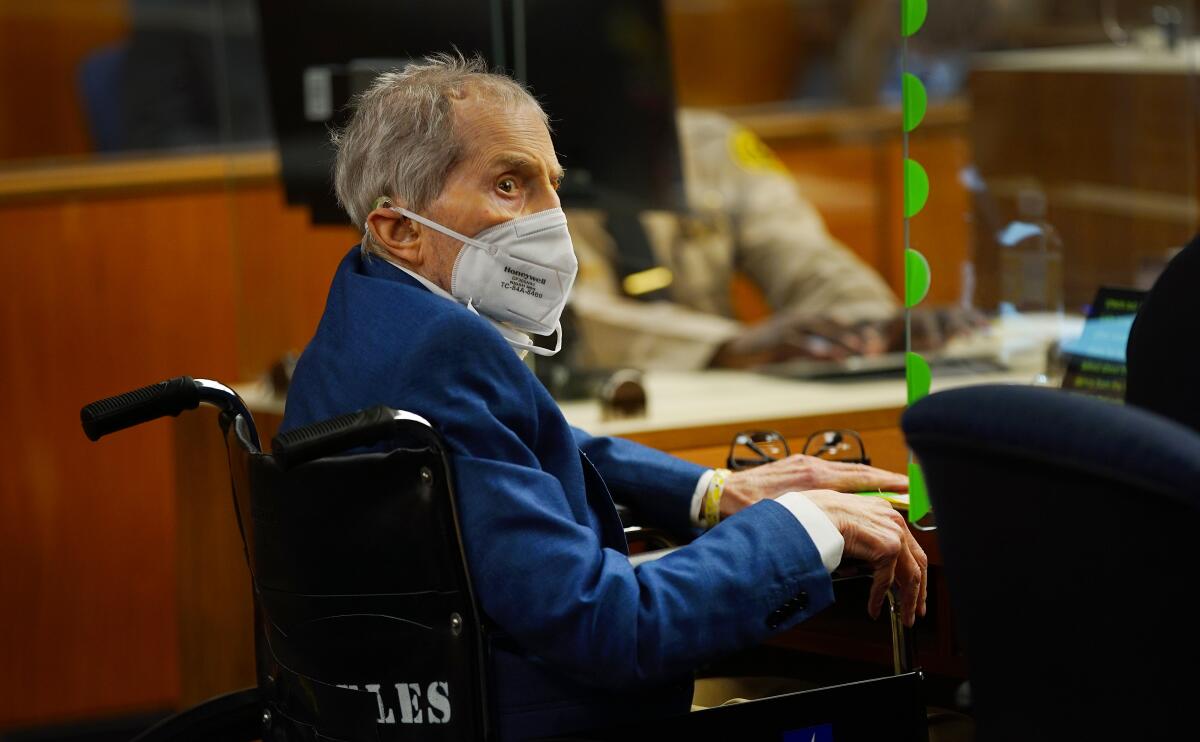
Robert Durst, a multimillionaire real estate heir and defendant in a labyrinthine, closely watched murder trial, was hospitalized Thursday morning for an unspecified health issue, forcing another setback in the long-delayed proceeding.
Los Angeles County Superior Court Judge Mark E. Windham, who is presiding over the trial, said Durst was sent to a hospital in the county jail system for “some incident this morning involving his health.”
The judge said he did not have much information about Durst’s condition, beyond that jail staff found the 78-year-old “down” and not in his wheelchair Thursday morning. Windham dismissed the jury and delayed the proceeding to Monday morning.
Chip Lewis, one of Durst’s attorneys, had no information about his client’s condition beyond what the judge disclosed in court. “All we know is that he was hospitalized earlier this morning,” he wrote in an email.
Robert Durst’s defense team is seeking a mistrial due to a lengthy delay in the real estate scion’s murder case caused by the coronavirus outbreak.
For the last month, Durst has been escorted into court each morning in a wheelchair to face the charge that he killed his friend and confidant, Susan Berman, at her Benedict Canyon home in 2000. According to the prosecution’s theory of the case, Durst feared that Berman was going to talk to authorities who had reopened an investigation into the disappearance of his wife, Kathleen Durst, who vanished in 1982 and has never been found.
Durst’s lawyers have argued that he did not kill Berman but stumbled on her body inside her home and panicked, later writing a letter to the Beverly Hills police alerting them to a “cadaver” at Berman’s address.
Deputy Dist. Atty. John Lewin, who is leading Durst’s prosecution, voiced his suspicions that the defendant was faking a medical crisis to force a mistrial. Lewin said Durst is “on record” in his calls from county jail saying he intended to feign dementia or seek a mistrial due to COVID-19.
“I have no idea whether this is legitimate or not, but obviously, given his history, it’s certainly suspect as to what his actual condition is,” Lewin said. Noting that Durst’s lawyers had twice sought mistrials during the previous day’s testimony, the prosecutor added, “It’s very clear the defense and the defendant want this trial to go away.”
Windham said it would be up to the doctors at the jail hospital to determine Durst’s fitness to stand trial.
“Is it false? Is it fake? They do a good job at the jail of ascertaining if a person is good to go to court,” he said.
Durst’s trial promises to feature a parade of witnesses testifying about their encounters with the eccentric millionaire across a span of some five decades. The proceedings, expected to go on for months, briefly got underway last year before being postponed for 14 months because of the COVID-19 pandemic.
When the trial resumed in May — with only 40 people allowed in the Inglewood courtroom, everyone in attendance wearing masks and reporters watching the proceedings remotely through a livestream — Durst’s lead attorney, Dick DeGuerin, asked Windham to declare a mistrial, saying his client needed to be hospitalized immediately for bladder cancer, among other health problems.
“The question is not whether he can endure the rigors of a trial; it’s whether he can survive,” DeGuerin asserted.
The judge did not grant DeGuerin’s motion but agreed to hear testimony from Durst’s doctor at a later time.
DeGuerin and his co-counsel had previously filed court papers seeking to stay the trial and have Durst released on bail so he could seek treatment for the cancer, which his attorneys said was not being addressed in jail.
In support of their request, the lawyers filed a report by Dr. Keith L. Klein, a physician at Cedars-Sinai Medical Center who examined Durst at the Twin Towers Correctional Facility last month. Klein found Durst was “profoundly malnourished” and at risk of “sudden death” from elevated levels of potassium or stroke, noting Durst had suffered a “mini stroke” during a court appearance in 2019.
“I would not be surprised if Mr. Durst died in the next twelve months,” Klein wrote.
Durst’s attorneys wrote that their client wants to testify in his own defense, which would subject him to “thorough and intense cross-examination.” The lawyers said Durst faces “the dilemma of deciding to either forgo what may be his best and intended defense, or to take the risk that the stress of testifying might result in serious injury or death.”
More to Read
Sign up for Essential California
The most important California stories and recommendations in your inbox every morning.
You may occasionally receive promotional content from the Los Angeles Times.
